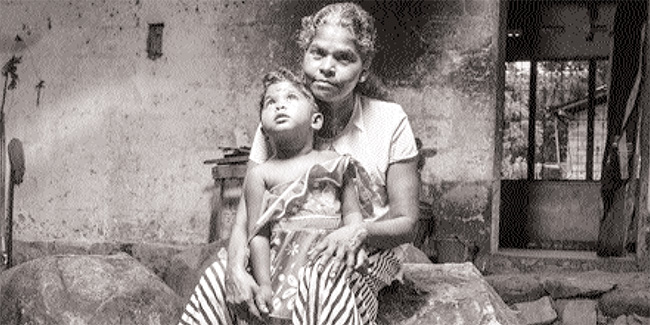News
Record inflation and skyrocketing prices leave over 6 million Sri Lankans food insecure: WFP

As prices keep healthy meals out of reach, some 61 per cent of households are regularly using coping strategies to cut down on costs, such as reducing the amount they eat and consuming increasingly less nutritious meals.
And with opportunities to make enough income in the medium to long-term decreasing for an estimated 200,000 families, the UN food relief agency anticipates that even more people will turn to these coping strategies as the crisis deepens.
“These days, we don’t have a proper meal but eat only rice and gravy,” one woman told WFP.
WFP is warning that a lack of nutrition has grave consequences for pregnant women, putting both their own and their children’s health at risk.
“Pregnant mothers need to eat nutritious meals every day, but the poorest find it harder and harder to afford the basics,” WFP Deputy Regional Director for Asia and the Pacific Anthea Webb said last month.
She told a local television station that by skipping meals, pregnant women were putting themselves and their children’s health at risk in a way that “carries throughout your life”.
To combat the food crisis and its effect on malnutrition, WFP has been distributing monthly food vouchers to pregnant women, valued at $40, in some of the poorest neighbourhoods, alongside antenatal care provided by the local government.
Debilitating inflation
Amidst a staggering 57.4 per cent inflation rate, steeply increasing food prices have crippled the population’s ability to put sufficient and nutritious meals on the table, rendering two in five households without adequate diets.
The food security situation is worst among people working in the farming estates sector – such as large tea plantations – where more than half of households are food insecure, according to WFP.
In all measures of food insecurity and coping strategies, these households have consistently poorer outcomes than urban and rural populations.
While urban households are depleting savings to cope for now, families on rural estates are already turning to credit, in order to buy food and other necessities.
“Poor families in cities and those who work on estates have seen their incomes plummet while market prices have soared,” the WFP official said.
A gloomy picture
Sri Lanka is suffering its worst economic crisis since gaining independence in 1948, which comes on the heels of successive waves of COVID-19, threatening to undo years of development progress and severely undermining the country’s ability to achieve the Sustainable Development Goals (SDGs), said WFP.
A current oil supply shortage has forced schools and government offices to close until further notice.
Reduced domestic agricultural production, a lack of foreign exchange reserves, and local currency depreciation, have fuelled the shortages.
The economic crisis will push families into hunger and poverty – some for the first time – adding to the half a million people who the World Bank estimates have fallen below the poverty line because of the pandemic.
WFP steps up
To address the downward spiralling situation, last month WFP launched a $60 million emergency appeal for food and nutrition to assist three million of the most at-risk Sri Lankans.
“We must act now before this becomes a humanitarian catastrophe,” warned WFP chief David Beasley in a tweet.
To date, the agency has delivered 88 per cent of the first batch of 2,375 vouchers it has available, and targeted three million people to receive emergency food, nutrition, and school meals, until December.
As prices keep healthy meals out of reach, some 61 per cent of households are regularly using food-based coping strategies, such as reducing the amount they eat and consuming increasingly less nutritious food.
And with the medium- to long-term income-generating capacities at severe risk for an estimated 200,000 families, the UN food relief agency anticipates that even more people will turn to these coping strategies as the crisis deepens.
“These days, we don’t have a proper meal but eat only rice and gravy,” one woman told WFP.
News
Rs 1. 3 bn yahapalana building deal under investigation

Several ex-Cabinet ministers questioned; Ranil, Sajith, too likely to be summoned
The Commission to Investigate Allegations of Bribery or Corruption (CIABOC) has initiated an inquiry into the shifting of the Agriculture Ministry situated at Rajamalwatte, to a building belonging to the D. P. Jayasinghe Group of Companies, at Rajagiriya, during the Yahapalana government.
The building was rented for a five-year period at a cost of over Rs 1 bn by the yahapalana government within months after the then President Maithripala Sirisena declared opened the 10-storey building complex.
The CIABOC yesterday morning recorded former yahapalana minister Gayantha Karunatilleke’s statement in connection with the investigation. Later in the day, CIABOC recorded the statement of SJB General Secretary Ranjith Maddumabanadara. Earlier CIABOC summoned former ministers Thalatha Atukorale, Wajira Abeywardena and Lakshman Kiriella. At the time of the finalisation of the deal, KIriella was in the UNP.
Sources said that former PM and President Ranil Wickremesinghe, too, was likely to be questioned in this regard. Responding to The Island queries, sources pointed out even SJB leader Sajith Premadasa was expected to be questioned.
The then Speaker Karu Jayasuriya is on record as having said that the building was rented in keeping with a decision taken by the government and not Parliament.
The UNP-SLFP coalition shifted the Agriculture Ministry to accommodate 16 Sectoral Oversight Committees therein.
Although the government paid as much as Rs. 21.5 mn monthly rent to D.P.A. Jayasinghe Company, the Agriculture Ministry failed to move in for over a year. The then Agriculture Minister Duminda Dissanayake sought Cabinet approval on Dec 1, 2015 to rent the building.
According to inquiries conducted earlier by the Presidential Commission appointed to probe state sector corruption, the Agriculture Ministry sought Cabinet approval for a new building after the then Prime Minister Wickremesinghe submitted a cabinet proposal on 21 September, 2015, to use the Agriculture Ministry building for Parliament’s sectoral oversight committees.
PM Wickremesinghe’s Secretary Saman Ekanayake has told the Commission that public funds could have been saved if the several vacant floors of Suhurupaya belonging to the Defence Ministry had been made available to the Agriculture Ministry.
By Shamindra Ferdinando ✍️
News
SL Railways suffers staggering losses; more than 2/3 of rail tracks out of service

Railway sources said that the damages caused to railway tracks could be more than USD 300 mn.
According to UNDP Rapid Crisis Assessment Sri Lanka’s railroad system, over 278 km of railways were exposed to cyclone-related flooding, including 35 railroad bridges nationwide. This figure reflects flooding only, but other hazards (such as localised debris, landslides, or damage to a single bridge) can also disrupt operations, meaning that even relatively small obstructions can render long stretches of railway non-operational. Like road exposure, railway exposure limits mobility and the capacity of affected populations to access key services and infrastructure.
At the level of divisional secretariats, Colombo and Thimbirigasyaya in Colombo District, Ja Ela in Gampaha District, as well as Mannar Town and Nanaddan in Mannar District all registered over 10 km of exposed railways each.
Commissioner-General of Essential Services B.K. Prabath Chandrakeerthi is on record as having said that only 478 kilometers of Sri Lanka’s 1,593-km railway network were currently usable following extensive damage caused by the recent cyclone.
News
US, SL advancing free, open, and resilient Indo-Pacific region: Embassy

Under Secretary of State for Political Affairs Allison Hooker arrived in Colombo yesterday (11) to underscore US interest in defence, trade and maritime security in line with their Indo-Pacific strategy.
The US embassy here issued the following statement: “Under Secretary Hooker will meet with Sri Lankan counterparts to discuss a wide range of bilateral issues, focused on deepening economic and commercial ties, strengthening defence cooperation, and supporting Sri Lanka’s economic and maritime sovereignty.
The United States and Sri Lanka share a strong and enduring partnership rooted in our mutual commitment to regional security, economic growth, and prosperity for our peoples. Through close cooperation on defence, trade, and maritime security, we are working together to advance a free, open, and resilient Indo-Pacific region.
As we continue to build on our strategic partnership, the United States also stands with the people of Sri Lanka as they respond to the devastating impacts of Cyclone Ditwah. We remain committed to working together to address both immediate challenges and long-term opportunities for our two nations, reflecting our ongoing commitment to the U.S.-Sri Lanka partnership.”
-

 Features3 days ago
Features3 days agoFinally, Mahinda Yapa sets the record straight
-

 News5 days ago
News5 days agoOver 35,000 drug offenders nabbed in 36 days
-

 News4 days ago
News4 days agoCyclone Ditwah leaves Sri Lanka’s biodiversity in ruins: Top scientist warns of unseen ecological disaster
-

 Business7 days ago
Business7 days agoLOLC Finance Factoring powers business growth
-

 News7 days ago
News7 days agoCPC delegation meets JVP for talks on disaster response
-

 News7 days ago
News7 days agoA 6th Year Accolade: The Eternal Opulence of My Fair Lady
-

 Features6 days ago
Features6 days agoThe Catastrophic Impact of Tropical Cyclone Ditwah on Sri Lanka:
-

 News5 days ago
News5 days agoRising water level in Malwathu Oya triggers alert in Thanthirimale













